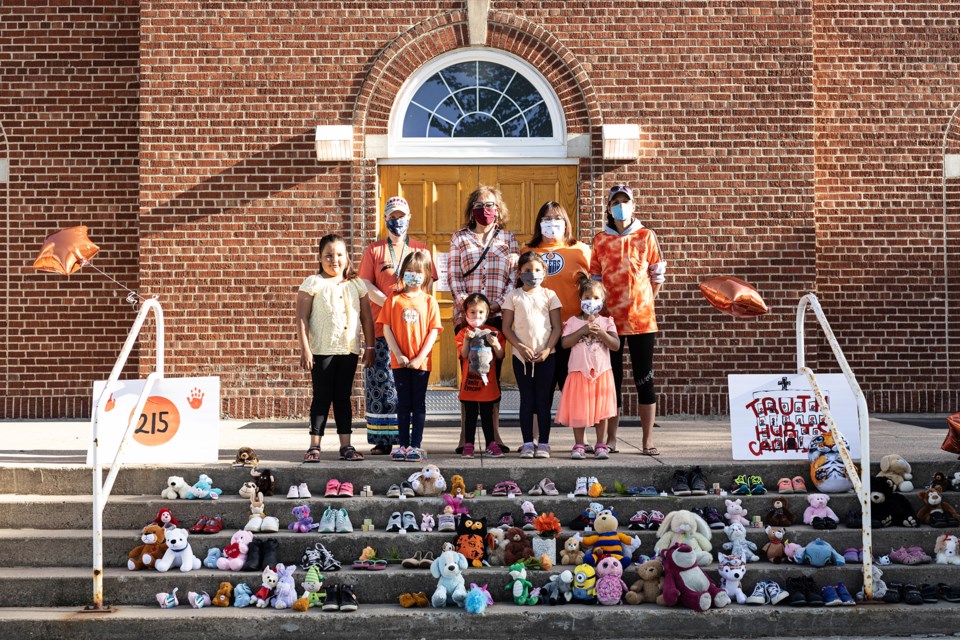ST. PAUL - A Monday evening memorial organized by staff members from the Head Start program at University nuhelot’įne thaiyots’į nistameyimâkanak Blue Quills took place on the steps of the St. Paul Roman Catholic cathedral, honouring the discovery of 215 children buried in an unmarked grave near the Kamloops Indian Residential School in British Columbia.
Elder Linda Boudreau-Semaganis was the first to speak to the crowd that had gathered to "honour the children. Not only the ones in Kamloops, but the ones across the country that have never been found."
She added, "We pray it'll never ever happen again, because history has a nasty way of reminding us. . . on the 27th, it reached up and slapped us from the graves in Kamloops. And we knew this all along."
On May 27, Tk’emlúps te Secwépemc Kukpi7 (Chief) Rosanne Casimir confirmed what was described as an "unthinkable loss," a loss that was spoken about but never documented by the Kamloops Indian Residential School.
With the help of a ground penetrating radar specialist, "the stark truth of the preliminary findings came to light – the confirmation of the remains of 215 children who were students of the Kamloops Indian Residential School," reads the statement released on May 27.
"We had a residential school here in St. Paul, not far from here," said Boudreau-Semaganis, as she stood near the steps of the St. Paul Cathedral. The first residential school was burned down in the early 1900s. The Blue Quills Residential School was then built, not far from St. Paul. The school operated as a residential school until the late 1960s.
In 1970, a sit-in took place at Blue Quills, and Indigenous communities in the region would eventually be successful in their bid to take over the school. The school now has university status, and many programs have a strong focus on retaining Indigenous languages.
When speaking about the recent discovery in Kamloops, Boudreau-Semaganis noted that while the number of children found in the unmarked graves was 215, each child represents two parents, and four grandparents, "and on and on."
It's said that each one of us walk with about 80 ancestors, explained Boudreau-Semaganis, "And I believe that."
She explained how her own family members attended residential school, and were affected by the experience. Her brother, for example, went to residential school when he was just three years old. "He was just a baby."
Boudreau-Semaganis encouraged the younger generations to continue to carry the torch, and work for equality.
"I really believe that as a community we have to reach out. We're all equal. We're all important. We all have something to offer the community, and we all bleed red," she said.
Boudreau-Semaganis spoke about the importance of providing young people with a good education that teaches "true history." She also encouraged people to work together to make the world a better place.
"Remember the past, but build a better, stronger, more equal future for everybody."
Town of St. Paul Maureen Miller also addressed the crowd, and said she felt "helpless" over the course of the past weekend, after hearing the news of the discovery in Kamloops.
"It's just incredibly heartbreaking."
She noted that there is now an opportunity to teach the story, and make it real.
"We can't forget these lives," said Miller.
Father Gerard Gauthier, Rector at the St. Paul Cathedral also spoke on Monday evening, reflecting on the tragedy. He spoke to the importance of keeping the memories of those lost, alive.
Coun. Leonard Jackson spoke on behalf of the leadership at Saddle Lake Cree Nation, and asked the Creator to forgive those who continue to deny the Indigenous way of life.
He pointed to the rows of shoes that were lined up on the stairs of the Cathedral, representing the children who attended residential schools and never returned home.
"I'm hurting," he stated, simply.
While Jackson is not a product of the residential school system himself, he was still affected by it and became a product of the Sixties Scoop, entering the foster system at a young ago.
Jackson spoke to how the stories told about residential schools are finally being given the truth and respect they deserve.
Twila Anderson, one of the event organizers and staff members at the Head Start program, offered some closing remarks, saying she was bothered by the findings in Kamloops, and wondered why no memorials were happening locally. So, after speaking with her fellow staff members, the group took it upon themselves to organize the event on Monday.
"We have to keep educating our kids," she said, adding, "We need to take initiative. We need to take action."
Anderson acknowledged that putting herself in front of people was out of her comfort zone, but she felt it was important to do so.
"This is where I stand. I'm standing up for my grandkids, my children, and all our future generations."
Read more from LakelandToday.ca



